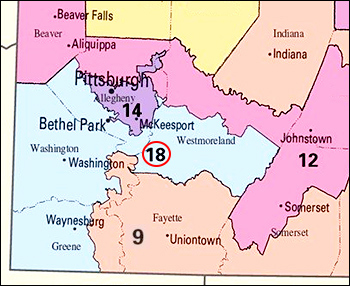By Jim Ellis
March 15, 2018 — Democrat Conor Lamb appears to have captured the 18th District special election held Tuesday in southwestern Pennsylvania, besting Republican state Rep. Rick Saccone (R-Canonsburg); but it will likely be a couple days before the result is finalized. The margin stands at 641 votes in Lamb’s favor of 228,177 ballots cast with all precincts reporting and absentee votes counted, meaning a recount could be ordered.Democrats will claim that this special election result sets the groundwork for the “blue wave” they have been predicting because their candidate converted a district that President Trump carried by 20 points and where resigned Rep. Tim Murphy (R-Pittsburgh) didn’t even draw an opponent during the past two elections.
Republicans will now counter saying that Lamb didn’t run like a liberal Democrat but was able to bring the large conservative western PA Democratic voter contingent — those who came out in droves to support President Trump, for example — back into his party’s column. During the campaign, Lamb publicly indicated that he would not support Minority Leader Nancy Pelosi (D-CA) as a way to convince the behaviorally conservative regional voter that he is not a national Democrat. Additionally, Lamb’s deep family ties to the Democratic base helped him as well. His grandfather is a former state House majority leader, and his uncle is the Pittsburgh City controller.
President Trump will undoubtedly take some credit for the close outcome. Prior to his visit to the district, pollsters were showing a much larger lead for Lamb than the preliminary final outcome produced. The final Monmouth University poll, for example, predicted a six to seven-point Lamb lead if the Democrats “surged” in turnout as they have done in other special elections around the country.
The roughly 228,000 voters cast, with more to follow once the military, provisional and absentee ballots are counted, is another example of a 2017-18 special congressional election turnout that exceeded the average midterm participation level. Though the last midterm in this particular district is not a good barometer because Rep. Murphy was unopposed, just over 166,000 people voted. Other similar contested Pennsylvania districts during the 2014 midterm recorded totals on or around the 200,000 mark. Therefore, while Democratic turnout was up, it is clear that Republican voters also turned out in robust numbers. This is the same pattern we saw in Montana and Georgia, the two other recent special congressional elections where the last midterm turnout was below the stand-alone contest.
The new redistricting map complicates this race’s outcome. With the congressional filing for the regular election cycle coming on March 20, Lamb will immediately be forced to declare the district in which he will seek re-election — he will almost assuredly head to the new 17th District to face incumbent Rep. Keith Rothfus (R-Sewickley) in a district that lies predominantly in Allegheny County, the place largely responsible for Lamb’s unofficial win. But, this choice means he must quickly pivot and face an incumbent who likely now has more than $1.5 million in his campaign bank account and 56 percent of his previous constituency in a new district that at least tilts Republican.
Still, with the new 14th District having the preponderance of the current District 18 constituency within its confines (57 percent of the district total) but becoming much more Republican than the current 18th (Trump carried the new 14th CD, 62-34 percent), Lamb’s political future does not lie in this seat.
After months of campaigning in a special election that was predicted to provide precursor trends for the coming general election, it appears the end result will provide less definitive information than was initially forecast.

